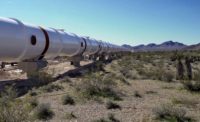
As January comes to a close, 2015 already has been a busy year for Elon Musk, president of Space Exploration Technologies. Musk's SpaceX rocket manufacturing company secured $1 billion in financing from Google and Fidelity Investments for a shared 10% stake. Musk also announced his intention to build a five-mile test track for his pet high-speed land-transportation project, known as the Hyperloop.
The Google-Fidelity announcement came days after Musk's Jan. 16 announcement of his plans to build a spacecraft production plant in Seattle.
"This is going to be the center of our satellite development activities," said Musk in his address. "[We want to] revolutionize the satellite side of things just as we've done with the rocket side of things."
 |
| MUSK |
"It's like rebuilding the internet in space," says Musk. In the vacuum of space, he says, information moves at the speed of light—40% faster than through fiberoptic cable on Earth.
He adds that the 4,000-satellite constellation is a step toward colonizing the planet Mars, which he has stated is his ultimate goal. When asked about price, Musk says the satellite internet service will be inexpensive but turn a profit.
"This is intended to be a significant amount of revenue and help fund a city on Mars," says Musk. The first phase of the satellite project will be complete in five years, he says, estimating the entire project will take 15 years to finish and cost $15 billion or more. Some of the money is coming from the new investors.
A recent SpaceX announcement said the Google-Fidelity investment would pay for continued innovation in space transport, reusability and satellite manufacturing. The company's CRS-5 Dragon already is proving itself. It has had seven successful launches and delivered cargo to the International Space Station five times. But SpaceX isn't the only startup with powerful backers to have its eye on launching LEO satellites.
Two days before Musk's Seattle address, OneWeb Ltd. announced that Virgin Group, London, together with Qualcomm, San Diego, are backing their own LEO network of 648 satellites. Greg Wyler, CEO of OneWeb, has experience: He founded O3b Networks, which has 12 medium-Earth-orbit (MEO) satellites 4,900 miles above the Earth to provide internet service to the Cook Islands and Nigeria, among other regions.
Besides satellite-network experience, Wyler holds Ku-band, or 12- to 18-GHz frequency, slots with the International Telecommunication Union (ITU), a Geneva-based United Nations agency that coordinates orbital slots and radio broadcast frequencies.





